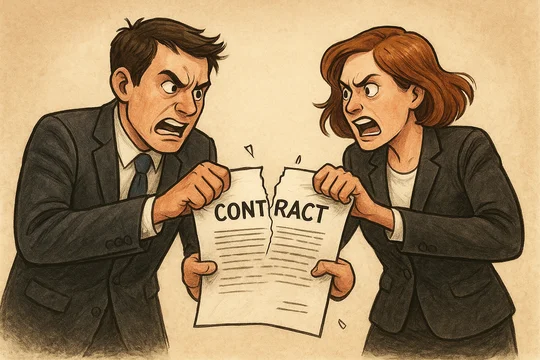A few months ago, we covered Inkit, Inc. v. Airslate, Inc., C.A. No. 23-793-RGA (D. Del. Mar. 26, 2025).
As a brief refresher, that case dealt with a claim that airSlate breached a settlement agreement resolving a trademark dispute. In filing the complaint, Inkit included an almost totally unredacted version of the settlement agreement, which had a confidentiality provision. Accordingly, airSlate counterclaimed for breach of the confidentiality provision.

At the time, the Court had ruled on summary judgment that all the elements of breach were proven except for damages (naturally a pretty tough thing to prove in this situation absent an actual settlement offer from another party asking for the same deal). But the case has since gone to trial and we've gotten to see the surprisingly large effect this breach by disclosure claim had on the overall outcome.
Surprisingly enough, this case actually went all the way to a bench trial. After trial, Judge Andrews held that both parties had prevailed on their respective claims of breach (including the claim for brief by disclosing the agreement), but neither had proven any specific damages.
The kicker is that the settlement agreement had a mandatory fee shifting provision. Thus, the Court's post-trial opinion held that each party was entitled to "$1 in nominal damages and attorneys' fees, costs, and expenses under Section 7 of the Settlement Agreement." Inkit, Inc. v. Airslate, Inc., C.A. No. 23-793-RGA, D.I. 231 at 44 (D. Del. Sept. 17, 2025) (emphasis added).
So how much did filing that agreement without redactions cost the plaintiff? Well we don't know for sure yet. Judge Andrews asked the parties to submit their proposed form of judgment in accordance with the order. The parties provided preliminary figures with their (disputed) judgment provisions. Judge Andrews declined to enter judgment on the figures without further briefing on the reasonableness of the fee requests and the submission of appropriate documentation, but the current figure on the table is $633,014.39. See id., D.I. 236.
BONUS RULE 68 ISSUE!
As it happened, there was a pretty big difference between the parties respective fee numbers, with Inkit requesting $1,481,762.55. So, despite the split judgment and only nominal damages, airSlate currently stands to walk out of this whole thing a bit the worse.
This prompted them to file a letter arguing against the one-sided bilateral fee award. Most of these were what you'd expect in any fee case, but there was one fun issue.
Apparently, shortly before trial, airSlate served a Rule 68 Offer of judgment, of $25,000.01. For those unfamiliar with this provision, Rule 68(a) provides that:
At least 14 days before the date set for trial, a party defending against a claim may serve on an opposing party an offer to allow judgment on specified terms, with the costs then accrued. If, within 14 days after being served, the opposing party serves written notice accepting the offer, either party may then file the offer and notice of acceptance, plus proof of service. The clerk must then enter judgment.
Rule 68(d) then goes on to state:
If the judgment that the offeree finally obtains is not more favorable than the unaccepted offer, the offeree must pay the costs incurred after the offer was made.
What impact does this obscure rule have on the ultimate fee award? We don't know yet, but Judge Andrews ordered briefing on the issue (as well as more in depth briefing and support for the requested fee amounts).
I note that Defendant in its letter brief relies upon an August 29, 2023, offer of judgment pursuant to Federal Rule of Civil Procedure 68. The offer was not accepted."Evidence of an unaccepted offer is not admissible except in a proceeding to determine costs." I was wondering why Defendant provided the offer of judgment in light of the above-quoted rule, but it appears that, in the context of a fee-shifting statute, attorneys' fees are costs. I have not looked for a case to nail down whether attorneys' fees are also "costs" when the basis of the fee-shifting is a contract, but it seems likely they would be.
The issues relating to Rule 68 are more complex than I would have expected. See Wright, Federal Practice and Procedure, Civil 3d §§ 3001-3007 (110 pages discussing the Rule) (2014). Thus, I need briefing in relation to Rule 68's impact, if any.
Id., D.I. 237 at 1-3 (internal citations omitted, except the Wright and Miller one, which I think is kinda funny).
If you enjoyed this post, consider subscribing to receive free e-mail updates about new posts.



